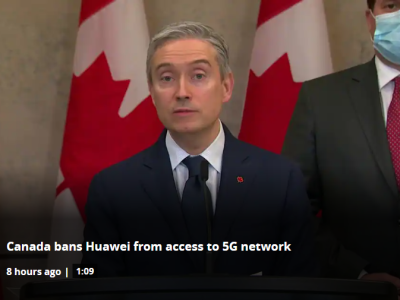The good old fashioned RCMP. Or rather, the new militarized RCMP. Nice to see them doing everything they can to not abuse the illegitimate power they have over the peasants.
OTTAWA, Ont. — In a “remarkable” disclosure, Canada’s national police force has described for the first time how it uses spyware to infiltrate mobile devices and collect data, including by remotely turning on the camera and microphone of a suspect’s phone or laptop.
The Royal Canadian Mounted Police says it only uses such tools in the most serious cases, when less intrusive techniques are unsuccessful. But until now, the force has not been open about its ability to employ malware to hack phones and other devices, despite using the tools for several years. Between 2018 and 2020, the RCMP said it deployed this technology in 10 investigations.
“This is a remarkable finding and, for the first time, publicly reveals that the RCMP is using spyware to infiltrate mobile devices, as well as the broad capabilities of their spyware,” he said.

As if there wasn’t enough of a reason to hate the RCMP, now we have this. I love how the RCMP say that they only use this in limited situations. Except that the limited situations aren’t when dealing with drug cartels or anything, it’s just when they can’t get the information they want with other means. So basically, they only don’t do this when they feel they don’t need to.
The RCMP says the increasing use of encrypted communication means police need new tools to keep up. But critics say the advent of the digital era means police have access to vastly more information than ever before. They say there needs to be a public discussion about what limits to place on the use of malware and other intrusive tools.
The team, which exists to intercept communication that can’t be obtained using traditional wiretaps, uses “on-device investigative tools.” The RCMP defines those as computer programs “installed on a targeted computing device that enables the collection of electronic evidence” — spyware, in other words.
The RCMP can use spyware to collect a broad range of data, including text messages, email, photos, videos, audio files, calendar entries and financial records. The police can also gather “audio recordings of private communications and other sounds within range of the targeted device” and “photographic images of persons, places and activities viewable by the camera(s) built into the targeted device,” the document says.
These tools are only used during serious criminal and national security investigations, the force says, and always require authorization from a judge. The RCMP declined an interview request and did not provide answers to written questions before this article was published.

Of course they don’t provide any examples of the judges refusing authorization for their spyware installations. How exactly they get this on the target devices is unclear to me, and I doubt they can simply snap their fingers and get this on there. In fact they say as much later on in the piece.
This isn’t the first time the RCMP has raised concerns about encryption. In 2016, the same year the CAIT program was launched, the police force gave reporters from the CBC and the Toronto Star an inside look at 10 active investigations it said were being stymied by the use of encryption. The move came as the government was pitching four proposals to enhance police capabilities, including a law that would compel suspects to unlock digital devices at the request of police with a judge’s warrant.
So no, they can’t snap their fingers and install their spyware. However, they can certainly try to spy on you as best they can without any recourse from their victims. And make no mistake, the judges are not going to be the slightest impediment to their spyware program.
“We haven’t had a public debate over the adoption of these tools, while they’re clearly being used by at least the RCMP and potentially other policing forces in Canada,” said Tamir Israel, staff lawyer at the University of Ottawa’s Samuelson-Glushko Canadian Internet Policy & Public Interest Clinic. “It’s really, really concerning that this type of intrusive tool is already in use, and we haven’t had that debate.”
Israel disputed the idea that police are at a disadvantage due to encryption. Thanks to our growing digital footprints, he said, law enforcement has seen a “massive increase” in their ability to monitor people. “That’s more than counterbalanced any potential drop-off there has been over these new types of communication tools,” he said. “Overall, they have a much more robust picture of what we’re doing [and] who we’re doing it with … than was the case historically.”
Israel believes Canada needs a legal framework that sets out which spyware tools can be used for policing and in what context.

Everybody thank Israel for standing up for the goyim’s right not to be spied on. Or in this case, inserting himself in the way so as to capture the natural outrage that this spy program will undoubtedly engender and make sure it’s kosher and impotent.
In the document, the RCMP says it didn’t consult the federal privacy commissioner before launching the CAIT program in 2016.
A spokesperson for privacy commissioner Philippe Dufresne confirmed to POLITICO that his office has not been notified about the CAIT program, and said the office will be following up with the RCMP. Government institutions are required to notify the privacy commissioner of “initiatives that may have an impact on the privacy of Canadians,” the spokesperson said in an email.

So it’s also a secret program, that the RCMP broke the law by not reporting to the privacy commissioner. Meaning this was too bad for even Trudeau’s privacy commissioner to know about.
Last year, a collaborative investigation called the Pegasus Project revealed that spyware licensed by Israeli firm NSO Group to governments for tracking criminals was also used to hack smartphones belonging to journalists and human rights activists.

Weird, because just a few paragraphs ago we saw Mr. Israel pretending to lead the charge against RCMP spying. Then it turns out that Country Israel is leading the charge in terms of the spying itself. Funny how that works.
In all honesty, this is just yet another black mark against the RCMP. I’m not getting too worked up about it, in part because I think it might be at least partly a scare tactic. They can’t just randomly force your phone to download spyware, at least for now, and the same is true for your laptop.
That they have the arrogance to try doing this garbage in secret is bad enough, but it doesn’t really fundamentally change the RCMP. They’re still a militarized police force. They’re still a political police force. And we still have nothing to hide from these creeps.















